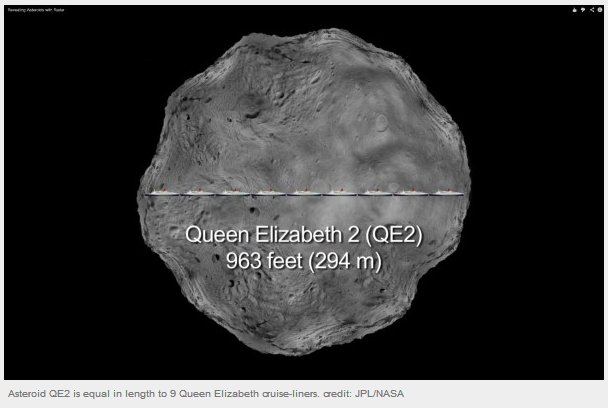Astronomers around the world are gearing up to get their first close-up views of a giant space rock and it’s new-found moon, set to hurtle by Earth Friday, May 31. The flyby will be broadcast live around the world via the web.
Remote controlled telescopes on the Canary Islands, off the coast of West Africa, will cover the asteroid’s closest approach to our planet which occurs at 4:59 p.m. EDT. You can catch the live coverage right here starting at 1:30 p.m. PDT / 4:30 p.m. EDT / 20:30 UTC...
Called 1998 QE2, this asteroid is considered a potentially hazardous object because it makes a regular close approach to Earth’s orbit... QE2 is a true mountain in motion, stretching 1.7 miles (2.7 kilometers) across—nine times the length of the 12-deck Queen Elizabeth 2 cruise ship...
...And astronomers have already made a surprising discovery... QE2 has been hiding its own moon—about 2,000 feet (600 meters) wide. Considering the hundreds of asteroids out there, NASA says this may not be that uncommon. As many as 16 percent of asteroids are actually part of binary or triplet systems.
...Luckily for us Earthlings, there is no chance of a collision. The asteroid will pass by on Friday at 4:59 p.m. EDT at a safe distance of 3.6 million miles (5.8 million kilometers)—15 times the distance separating the Earth from the moon. This is the closest approach the asteroid will make to our planet for at least the next two centuries...
Despite its relative distance from Earth, QE2 will still be visible to backyard telescopes (at least four to six inches in mirror size) as a faint 11th magnitude star (100 times fainter than what the human eye can see) silently gliding across the southern skies the next few nights...
...NASA astronomers plan to train two of the world’s most powerful radio telescopes on the asteroid as it makes its closest approach today. By bouncing radio signals off the tumbling asteroid, they hope to create a detailed map that will reveal information about its rotation, shape, and surface features as small as 12 feet (3.75 meters) across...
There is no truth to the rumor that Michael Moore's gravitational field has influenced the path of the asteroid.
Hat tip: BadBlue Tech News.



BLAME BUSH !!
ReplyDelete